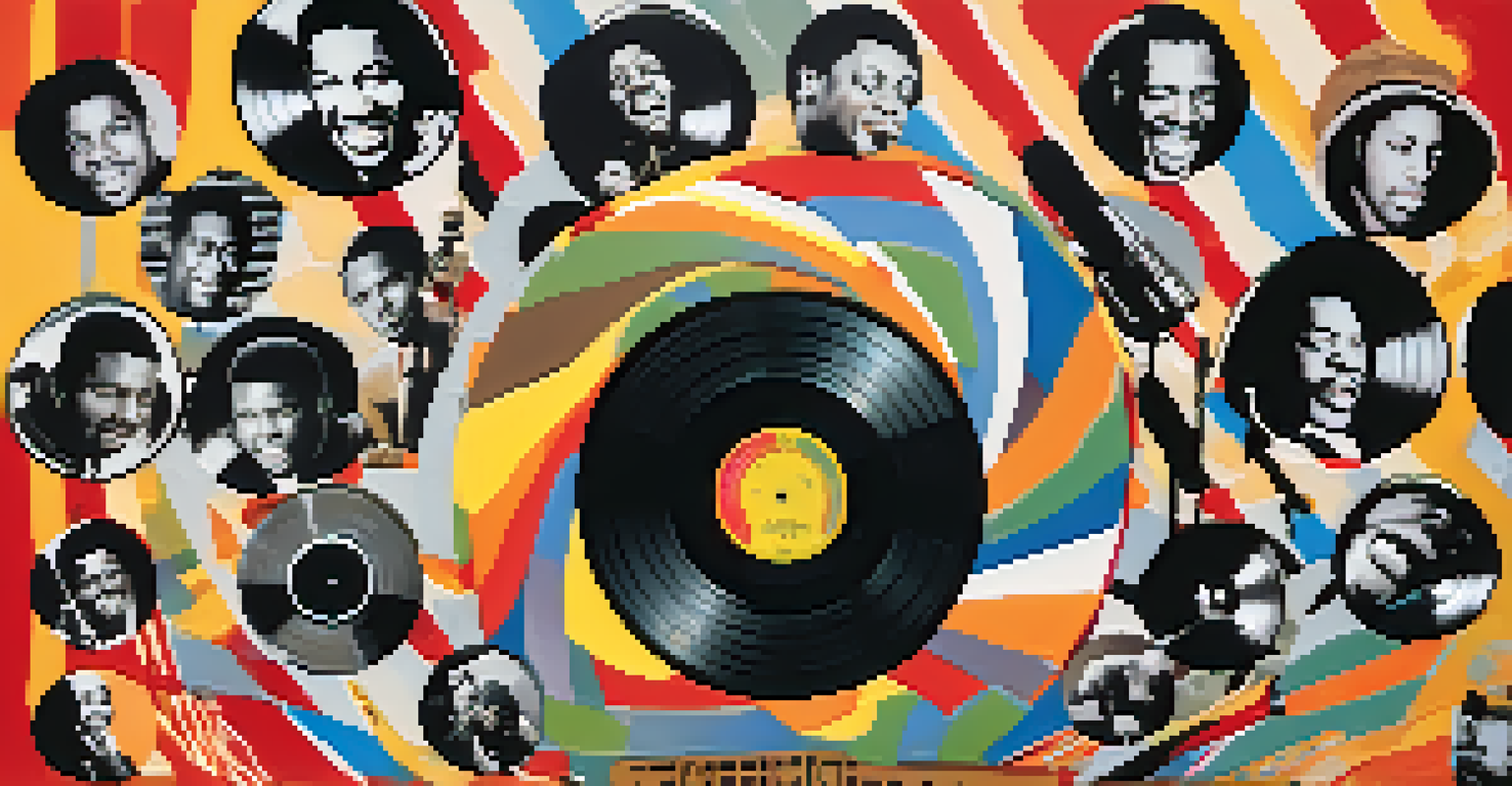Memphis's Role in the Civil Rights Movement and Music

Memphis: A Crucial Crossroad for Civil Rights
Memphis emerged as a pivotal location during the Civil Rights Movement, acting as a melting pot of social change. With its rich cultural tapestry, the city was a stage for both peaceful protests and passionate speeches that echoed through its streets. The convergence of various activists and leaders helped to shape a national dialogue around equality and justice.
Injustice anywhere is a threat to justice everywhere.
Organizations like the Southern Christian Leadership Conference (SCLC) and the NAACP played significant roles in mobilizing efforts within the city. These groups organized protests, voter registration drives, and educational initiatives that aimed to empower African Americans. The atmosphere was charged with a sense of urgency and hope, as citizens rallied for their rights.
Memphis's geographic location also contributed to its significance, as it served as a bridge between the Deep South and the broader movement. This positioning allowed activists to draw attention to issues affecting African Americans, amplifying their voices and their demands for change.
The Assassination of Dr. Martin Luther King Jr.
One of the most poignant moments in Memphis's history occurred on April 4, 1968, when Dr. Martin Luther King Jr. was assassinated at the Lorraine Motel. This tragic event not only shocked the nation but also solidified Memphis's place in the Civil Rights narrative. The motel has since become a symbol of the struggle for justice and equality, drawing visitors from around the world.

In the aftermath of King's death, Memphis became a focal point for mourning and mobilization. The city witnessed an outpouring of grief, but also a surge in activism as people sought to honor his legacy. This period marked a turning point, galvanizing the community to continue fighting for civil rights.
Memphis as a Civil Rights Hub
Memphis played a crucial role in the Civil Rights Movement, serving as a gathering place for activists and a catalyst for social change.
Today, the National Civil Rights Museum, located at the former Lorraine Motel, stands as a testament to King's impact and the ongoing struggle for civil rights. It educates visitors about the movement's history while inspiring future generations to advocate for equality.
Memphis's Musical Heritage and Its Influence
Memphis is not just known for its role in civil rights; it's also a cornerstone of American music history. The city birthed legendary genres like blues, soul, and rock 'n' roll, each resonating with the struggles and triumphs of its people. Institutions like Beale Street became the heartbeat of musical expression, where artists used their craft to voice social issues.
Music is the weapon of the future.
Musicians such as B.B. King and Otis Redding emerged from Memphis, infusing their work with the raw emotions stemming from the civil rights struggle. Their songs often reflected themes of love, resilience, and hope, making them relatable to a wider audience. This connection between music and activism helped to bridge cultural divides and promote understanding.
The legacy of Memphis's music continues to inspire artists today, who recognize the power of their art as a tool for change. The city remains a vital hub for creativity, where new generations of musicians carry forward the message of equality and justice through their work.
The Impact of Stax Records and Motown
Stax Records, founded in Memphis in the 1960s, played a critical role in shaping the sound of soul music while also promoting social change. The label was home to iconic artists like Isaac Hayes and Booker T. & the MG's, who not only produced chart-topping hits but also addressed social issues in their music. Stax became a cultural touchstone, bridging the gap between entertainment and activism.
Motown, while based in Detroit, had significant ties to Memphis, with many artists collaborating and influencing each other. The Motown sound was characterized by its upbeat rhythms and catchy melodies, often masking deeper messages about love and struggle. This intersection of styles enriched the music scene and further fueled the civil rights dialogue.
Musical Heritage and Activism
The city's rich musical history, exemplified by legends like B.B. King, intertwines with its civil rights narrative, using music as a powerful tool for social justice.
The influence of Stax and Motown continues to resonate, as their music remains a vital part of American culture. Today, their legacies inspire new artists to create music that not only entertains but also sparks conversations around social justice.
Community Activism and Music Festivals
Community activism in Memphis doesn't just stop at civil rights; it thrives through music festivals and cultural events that celebrate the city's heritage. Festivals like the Beale Street Music Festival not only bring together diverse artists but also highlight the importance of community engagement in social change. These gatherings foster unity and allow attendees to reflect on the past while celebrating the present.
During these events, local musicians often use their platforms to address pressing social issues, creating a dialogue through their performances. This blend of music and activism reinforces the idea that art can be a powerful vehicle for change. It encourages attendees to think critically about the world around them.
Moreover, these festivals serve as reminders of Memphis's rich history and ongoing journey toward equality. They provide a space for healing, remembrance, and celebration, ensuring that the lessons of the past are not forgotten.
Memphis's Role in Shaping Civil Rights Legislation
The efforts in Memphis were instrumental in shaping civil rights legislation at both state and national levels. Activists from the city played key roles in organizing protests and lobbying for changes that would ensure equal rights. Their determination and resilience brought national attention to local issues, pushing lawmakers to take action.
One significant outcome of these efforts was the passing of the Civil Rights Act of 1964, which prohibited discrimination based on race, color, religion, sex, or national origin. This landmark legislation was a direct result of the tireless work of activists who risked everything to fight for justice. Memphis's contributions to this movement cannot be overstated.
Legacy of Community Mobilization
Efforts in Memphis significantly influenced civil rights legislation, showcasing how grassroots activism can lead to substantial societal change.
Today, the legacy of this activism continues to inspire new generations to advocate for change. The city remains a beacon of hope, showing that grassroots efforts can lead to significant societal shifts.
Conclusion: The Enduring Legacy of Memphis
Memphis's role in the Civil Rights Movement and its musical heritage is a rich tapestry woven from history, culture, and resilience. The city has witnessed profound struggles, yet it stands as a testament to the power of community and the arts in fostering change. Each note played and each protest held has contributed to a legacy that continues to inspire.
As we reflect on the past, it’s essential to recognize that the fight for equality is ongoing. Memphis serves as a reminder that music and activism are intertwined; together, they create a powerful force for social change. By embracing this legacy, we honor those who came before us and empower those who will follow.

In celebrating Memphis, we not only remember its history but also commit to a future where justice and equality prevail. The city continues to be a source of inspiration, proving that the rhythm of change never truly stops.